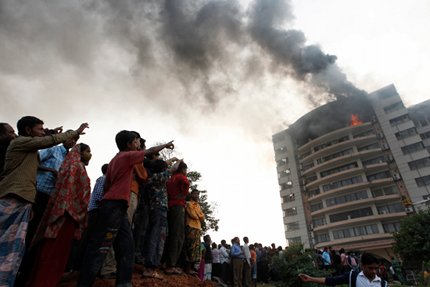
Call on Gap to protect Bangladeshi workers' lives
Since 2006 at least 500 Bangladeshi garment workers have died in factory fires while sewing clothing for giant fashion companies, like Gap and H&M. Future tragic deaths could be prevented if companies like Gap would follow the lead of brands like Tommy Hilfiger and the German retailer Tchibo, by agreeing to a fire safety program that includes really independent inspections, mandatory repairs and renovations of safety hazards, a central role for workers and unions, transparency and binding commitments to protect workers.
Six months ago Gap publicly promised it would sign on to a worker safety program similar to the Tommy Hilfiger and Tchibo agreement. Instead this month Gap announced their own, corporate-controlled, fire safety program – one that includes no legal commitments to workers, no oversight by worker organisations, and no transparency. This is yet another version of Gap saying: ‘trust us; we care about our workers’ – like the programs they had in place when 29 workers were killed at their Bangladeshi supplier in December 2010.
Join Bangladeshi and international unions and labor groups that are calling on Gap to stop their public relations games and commit to a real fire safety program that will save the lives of Bangladeshi garment workers.
Take action, and sign the following petition letter to Gap:
Dear Gap:
I am shocked to learn that, although workers have died in factory fires while sewing Gap clothing, you have refused to follow other companies by signing a credible fire safety program with trade unions and labour rights organisations.
As a consumer, I am deeply concerned that the Gap has reneged on its public promise to adopt a worker safety program that includes really independent inspections, mandatory repairs and renovations of safety hazards, a central role for workers and unions, transparency, and binding commitments to protect workers.
I find it even more disturbing that this month Gap reverted to the same old public relations stunts by announcing a corporate-controlled fire safety program with no legal commitments to workers, no oversight by worker organizations, and no transparency.
As you know, other brands like Tommy Hilfiger and Tchibo have already agreed to a fire safety program that includes worker input, transparency, and binding commitments to protect workers. Is your company ready to make the same commitment?
I support the consortium of Bangladeshi and international unions and labor groups calling on your company to stop the public relations games and commit to a real fire safety program that will save the lives of Gap's Bangladeshi workers.
Thank you for your attention on this deeply concerning matter.
Sincerely,